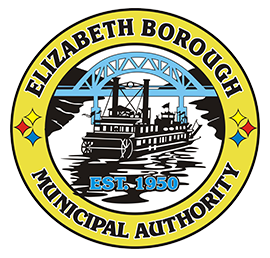Fat, Oil, and Grease (FOG) is very bad for our water
The Elizabeth Borough Municipal Authority monitors Fats, Oil, and Grease (FOGs) in our sewer lines which reduces line capacity or worse blocking the wastewater flow completely causing sewage to back up into our homes and/or the environment.
As part of our routine maintenance program, the Authority regularly “jet” the sewer lines and/or use a degreaser to break up the grease. These are only temporary fixes and just pass the problem further down the system to interceptor sewers, pump stations, and the treatment plant where the grease will solidify again. FOGs are not treated by the process at the treatment plant.
Fats, oil, and grease interfere with the treatment by coating the bacteria that work to clean the water.
Also, since FOGs float they often pass through the plant creating visible residue on the surface of receiving waters. The only people that can help solve problem are the users of the system. Using better methods of grease disposal will assist in making our township a cleaner and safer place to live.
Grease Traps
All owners of occupied buildings containing food preparation facilities (with the exception of individual private living quarters or dwellings) are mandated to install grease traps or interceptors at the sole cost and expense of the owner. After installation they are often overlooked and not maintained properly, which then leads to many sewer problems.
When grease is dumped into the lines it often clogs the lines and/or reduces the size of the line which leads to back-ups during wet weather events. To prevent grease from becoming a problem, the Authority will be conducting inspections of the grease traps at all restaurants and food preparation facilities in the service area.
If you own a facility that has a grease trap please be sure to have it cleaned and maintained on a regular basis and send all cleaning records to the Authority.
How you can help:
Residential/Commercial
- Don’t pour cooking oil, grease, or foods down the drain.
- Do pour leftover grease into a separate container such as an empty coffee can and discard in the trash.
- Don’t use garbage disposal units for any meat waste.
- Do treat fatty waste as solid waste—use the garbage can.
- Don’t use the sink to wash heavy oil or grease out of dishes, pots or pans.
- Do wipe out pots and pans with paper towels before washing and scrape leftover foods from plates into the trash.
Commercial
- Don’t use chemical emulsifies to clean up grease. The grease just settles out in the sewer, eventually causing a blockage.
- Do maintain your grease trap and have it cleaned regularly by a licensed hauler.
